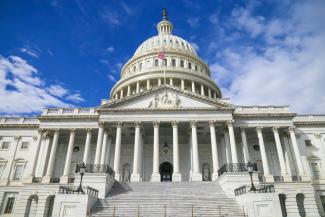
CARES Act 2020
The CARES (Coronavirus Aid, Relief and Economic Security) Act was signed by President Trump to help provide financial stability and relief for individuals and businesses affected by COVID-19. While the bill is very broad and addresses a number of areas and industries, and many of the specific details will still need to be analyzed, we believe the following are important to highlight for individuals and their families.
Cash Payments and Unemployment Assistance
- 2020 Recovery Payment: All U.S. residents with adjusted gross income up to $75,000 ($150,000 joint filers) are eligible for a $1,200 ($2,400) payment, as well as an additional $500 per child (under age 17).
- There are no minimum income requirements for the payment. Individuals with little or no income are eligible provided they are not a dependent of another taxpayer and have a work-eligible Social Security number.
- This amount is reduced by $5 for every $100 over the income limit above, so it would be fully phased out for those with incomes over $99,000 (single) and $198,000 (joint filers) with no children.
- Increased Unemployment Assistance: Provides an additional $600/week payment to each recipient of unemployment insurance for up to four months.
- Provides an additional 13 weeks of unemployment benefits through Dec. 31, 2020, for those who remain unemployed after state unemployment benefits are no longer available.
- Delay in Tax Filing Deadline: Individuals now have until July 15, 2020, to file their 2019 Federal tax returns instead of April 15. As of this writing not every State has extended their deadlines.
- The Treasury Department has also postponed the deadline for making IRA contributions until the earlier of the taxpayer filing their 2019 tax return or July 15.
Retirement Account Changes
The following apply to qualifying individuals including those who are diagnosed with COVID-19, have a spouse or dependent who is diagnosed with COVID-19 or experience adverse financial consequences as a result of COVID-19, including quarantines, layoffs, business closures or child care responsibilities.
- Elimination of Early Withdrawal Penalty: Waives the 10% early withdrawal penalty for withdrawals up to $100,000 from qualified retirement accounts, including IRAs and 401(k) plans, for retirement plan participants who qualify for COVID-19 relief. Income tax on the distribution would still be owed but could be paid over a three-year period. Individuals could "recontribute" the funds to the plan within three years without regard to contribution limits. While the law allows for these types of penalty-free distributions from these retirement plans, the participant must contact their plan administrator to determine whether their plan allows for COVID-19 distributions.
- Increase in the Retirement Plan Loan Amount: Increases the amount that can be taken as a loan from a qualified retirement plan from $50,000 to $100,000 for 2020.
- 2020 RMDs Waived for Retirement Accounts: With the exception of defined benefit plans, required minimum distribution‘s (RMD) are waived for all employer plans and IRA’s in 2020, including inherited accounts. This provision also applies to RMDs due in 2020, but attributable to 2019. Individuals do not need to meet COVID-19 qualifying criteria to waive RMDs for 2020.
Enhanced Tax Benefits for Charitable Gifts
- $300 Deduction of Cash Contributions: Ability for an above-the-line deduction up to $300 of cash contributions to charities, regardless of whether the individual itemizes deductions.
- Changes to Limits on Charitable Contributions:
- Individuals: For those who itemize their deductions for charitable giving, the 50% of adjusted gross income limit is suspended for 2020.
- Corporations: The 10% limit on charitable contributions is increased to 25% of taxable income.
Mortgages
- Mortgage Relief for Homeowners: Requires the servicers of federally backed mortgages to postpone mortgage payments at the request of the borrower, provided the borrower affirms financial hardship due to COVID-19. The postponement must be granted for up to 180 days and extended for an additional period of up to 180 days at the request of the borrower.
- Foreclosure Moratorium: Prevents the servicer of a federally backed mortgage loan to initiate any foreclosure process for at least 60 days beginning on March 18, 2020.
- Eviction Relief for Renters: For 120 days after the CARES Act date of enactment, landlords with mortgages backed by the U.S. Department of Housing and Urban Development (HUD), Fannie Mae, Freddie Mac, and other federal entities cannot pursue eviction for their tenants. Landlords also can't charge any fees or penalties related to nonpayment of rent.
Student Loans/Education
- Loan Payment Suspension: Suspends payments automatically for federally held student loans through Sept. 30, 2020, with no interest accruing or penalties during the period of suspension.
- Additional Provisions: Contains a variety of other emergency-relief provisions related to education, and specifically the impact of many students being sent home mid-semester. For example, it allows universities to make payments to students who were unable to complete work-study programs.
This material is intended to be educational in nature, and not as a recommendation or substitute for individualized investment or tax related advice. Clients are encouraged to consult with their own professional advisers, including investment advisers and tax advisors before making any investment or tax related decisions.
Source: https://www.congress.gov/bill/116th-congress/senate-bill/3548/text

